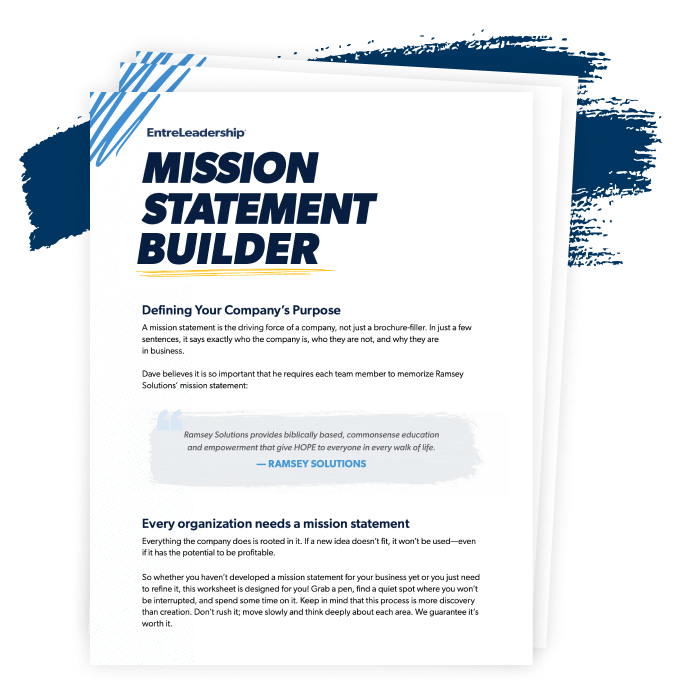
Key Takeaways
Seven ways to lead with purpose:
- Write your company mission statement. Declare what your business is about and why it exists.
- Cast your vision. Give your team a unified direction to work toward.
- Live out your core values. These guiding principles reflect who you are, what you stand for, and what success looks like to you.
- Develop leaders. Put sharp, hungry people around you to stay sharp and take new ground.
- Delegate. Show your team you trust them and give them ownership of your purpose.
- Tell your story. Share your humble beginnings and some of your crazy ideas throughout your journey.
- Serve and give to others. Treat others the way you want to be treated.
Say you’ve got a choice: You can steer your business with a clear sense of purpose or let it wander wherever the wind takes it. What’s your pick? That’s easy, right? Purpose all the way! When you lead with purpose, your business has direction, you build momentum, and your team experiences increased job satisfaction as you all work together to make a positive impact.
But here’s the thing: Just 42% of workers believe their company’s purpose statement actually has an impact on how the business is run.1 That means there’s a disconnect between what the leaders say the business is all about and what it actually is all about. That’s a big leadership problem. Why? Because if you don’t guide your business with a genuine sense of purpose, everything about your business will drift. Next thing you know, your team members won’t have clear goals, shared unity or any spark of joy in working hard.
Depressing? It could be if you bury your head in the sand. So let’s talk about how you can lead with purpose so your business can experience all these benefits that come with it:
- Increased focus on your goals
- Never-quit courage and grit
- Ability to attract and keep all-star team members
- Ridiculously passionate fans
- Greater opportunities to help team members grow
- A real possibility to make the world better
The choice is clear—purpose all the way!
How to Lead With Purpose
Here’s how to level up your purpose-driven leadership:
1. Write your company mission statement.
To lead with purpose, you have to start by knowing your purpose. So your first order of business is to hash out your mission statement (also called a purpose statement). What’s a mission statement? It’s a straightforward declaration of what your business is about and why it exists. For example, here’s Ramsey Solutions’ mission statement: To provide biblically based, commonsense education and empowerment that give hope to everyone in every walk of life.
Everything your company does should be rooted in your mission or purpose statement. If a new idea doesn’t fit what you’re about, throw it out—even if it has the potential to be profitable. That kind of focus means you and your team can move forward together to achieve unstoppable results.
Get the Free Mission Statement Builder
You don’t have to figure it out alone! Download the easy-to-follow EntreLeadership Mission Statement Builder that will help you write a mission statement that gets you and your team fired up and on the same page.
2. Cast your vision.
As a leader, you probably see a world of possibility your company can achieve. It’s up to you to share your vision clearly and often. When you do that well, you’ll inspire your team members to storm the gates of heaven and hell with you to create a better future. Motivational speaker Zig Ziglar said, “If you aim at nothing, you will hit it every time.” But when you cast a compelling vision, you give your team a unified direction to head toward.
3. Live out your core values.
Your core values are guiding principles that reflect who you are, what you stand for, and what success looks like to you. They help you and your team members filter goals and make decisions.
Remember Ramsey’s mission? It includes educating and empowering others to give them hope, which ties directly to at least two of Ramsey’s core values: Crusade and Marketplace Service. Crusade emphasizes that Ramsey team members do work that matters (give hope), and Marketplace Service says if we help enough people (educate and empower), we don’t have to worry about money. See how values link to purpose? When you live them out, you can’t help but stay fired up about what you’re called to accomplish!
4. Develop leaders.
Need a way to stay challenged and accountable to lead with purpose? Develop rock-star leaders. They’ll keep you on your toes. Just like iron sharpens iron, when you put people around you who are sharp and hungry to help you take new ground, you stay sharp. You also advance your company’s impact together.
5. Delegate.
Former CEO of General Electric Jack Welch said, “Before you are a leader, success is all about growing yourself. When you become a leader, success is all about growing others.” And one of the best ways to grow others is to delegate increasing responsibilities to them when they’re ready. Here’s why delegation is so powerful:
- It shows your team you trust them and gives them ownership of your company purpose.
- It empowers your team members to bring their best and stay engaged in work that matters.
- It creates margin for you to plan strategically and keep casting vision so your business can scale.
6. Tell your story.
If you grew a simple idea into a business, way to go—you’re a hero! Now you get to inspire others by sharing your story. Include the dream that got you started, your humble beginnings, and some of your crazy and remarkable ideas throughout your journey. Tell your team, your customers and your vendors about all the times you refused to quit. As you talk about your sacrifices, victories and guiding mission, you’ll stoke a fresh fire in your belly to keep leading with purpose. And your team will be excited to play a part in the next leg of the journey.
7. Serve and give to others.
You might’ve grown up hearing the golden rule. It’s a challenge to treat others the way you want to be treated. And it turns out, the results of that are truly golden. When you serve others and give generously, your brain releases feel-good chemicals that regulate your mood, give you a sense of pleasure, and create connections with the people you’re honoring. Investing in others could even reduce your stress and help you live longer!2 But here’s the best part: Placing others ahead of yourself creates what’s called “helper’s high” that energizes you to keep doing good and lead with a purpose that’s bigger than you.
Fun fact: A recent Ramsey survey revealed that 76% of small-business owners already support their communities through generosity.3 High-five if you’re leading with purpose by serving others!
What’s Next: Map Your Mission
So, now that we’ve walked through the seven ways to lead with purpose, it’s time to make your purpose-driven journey happen.
Start by crafting a company mission statement that spells out your why. This will become the North Star that guides your business and inspires others to join your crusade to make a difference.
Need help writing your mission statement?

